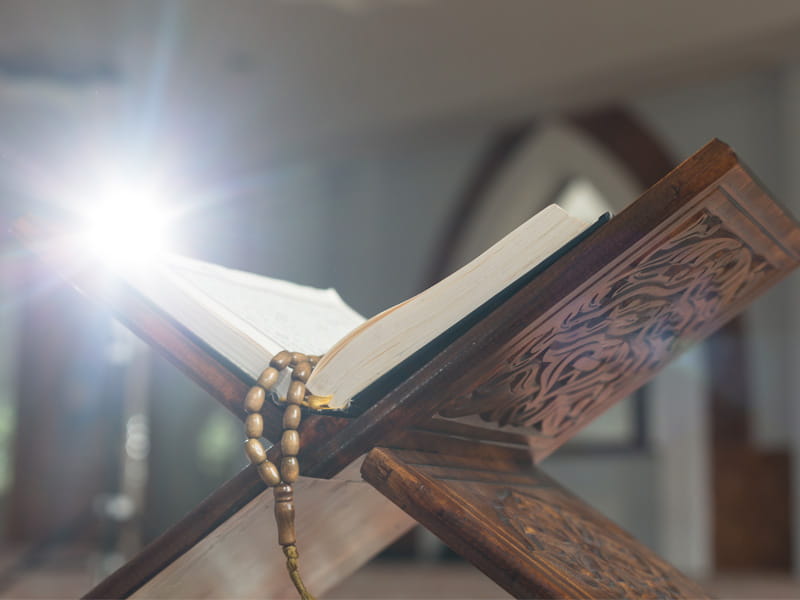HUNTSVILLE, Ala.--Growing up here, Matinah Lewis often hid that her family was Muslim. Today, Lewis--now Hediyah Al-Amin--proudly displays it by veiling not only her head, but her face as well.
A former high school dance team member and vice president of the Student Government Association, she believes she is much more "beautiful" now with her hijab (head covering) and niqab (face veil).
"I think we have it all backward in America," said Al-Amin during a recent visit to relatives here. "Here, we get all fixed up for people we don't even know, and at home we wear our hair in curlers and look our worst for our family. It should be the other way around -- we should look our best for the ones we love and not matter to other people how we look."
Al-Amin, who lives in Qatar, said the veil is "not a symbol of oppression. I've never felt more beautiful in my life. I love it. I still wear my mini-skirt and my toe rings when I'm at home. I reserve my beauty for my husband."
Her husband, Akil, is from North Carolina where they met when she was attending Bennett College, an all-women private school in Greensboro. She majored in education and began wearing the hijab while a junior in college. That year, she was named to the school's homecoming court and also got married.
After graduating from college, Al-Amin and her husband decided they wanted to live in a mostly Muslim country. They searched the Internet and found an advertisement for English teachers in Doha, Qatar.
"As a teen growing up here, I wanted to be accepted, so I didn't embrace Muslim practices until I went to college," said Al-Amin. "I would go to church events with my friends, and I was on the dance team and ran track. I felt so alone here. I had to get to a place where I could be confident of being a Muslim. I have always been a minority. I wanted to see what it was like to live in a Muslim country where no one stared at me on the street."
Until Sept. 11, few Americans understood the meaning of Ramadan, the Islamic month of fasting. Rather than explain to her friends why she was fasting during high school lunch period, she told them she was saving her money or was just "not hungry" when asked why she wasn't eating.
After moving to the Middle East, Al-Amin decided to change her name to Hediyah, which means "guidance."
After the Sept. 11 attacks, she said, she was afraid to return to her
homeland not only for fear of being harassed for her faith, but because her
son carried the same Arabic name as the alleged Sept. 11 mastermind -- Osama
bin Laden.
"When it (Sept. 11) first happened, my husband told me something was going on in America and to check the Internet to see what it was," Al-Amin recalled, tears welling in her brown eyes. "I thought, `It can't be real, and how can I go home?"'
She was especially concerned her son would be teased and criticized for having the name Usama -- the same as Osama -- in Arabic. It is a common Middle Eastern name meaning "lion" or "strong."
Usama had some medical problems when he was born, which she thought might cause their son problems later in life. "I'm very particular about the names of my children, but we especially wanted my son to have a name which meant strong, so that's why we chose Usama. I was afraid he would be teased here, but so far no one has said anything."
Although Qatar is one of America's strongest Middle Eastern allies, Al-Amin said she began to feel some tenseness among the Qatar residents after Sept. 11.
"I believe there is good in everything that happens, even the most evil thing," she said. "I felt some anti-Americanism among the Qatar youths, so I started talking with them as an American Muslim and they accepted us. I felt like that's what I had to do."
While she felt fear about coming home last year for the first time since Sept. 11, her parents assured her her family would be safe.
"No one said anything to us, and that's one of the best things about American culture," she said. "I guess maybe it's just good old Southern hospitality or manners."
At the same time, she said she welcomes questions from strangers, especially children, about her beliefs. "I want people to ask me about my faith," she said. "That's the best way to explain it to them. I don't argue with people. This is just what I think. We are all sons and daughters of Abraham. Can't we just all get along?"

